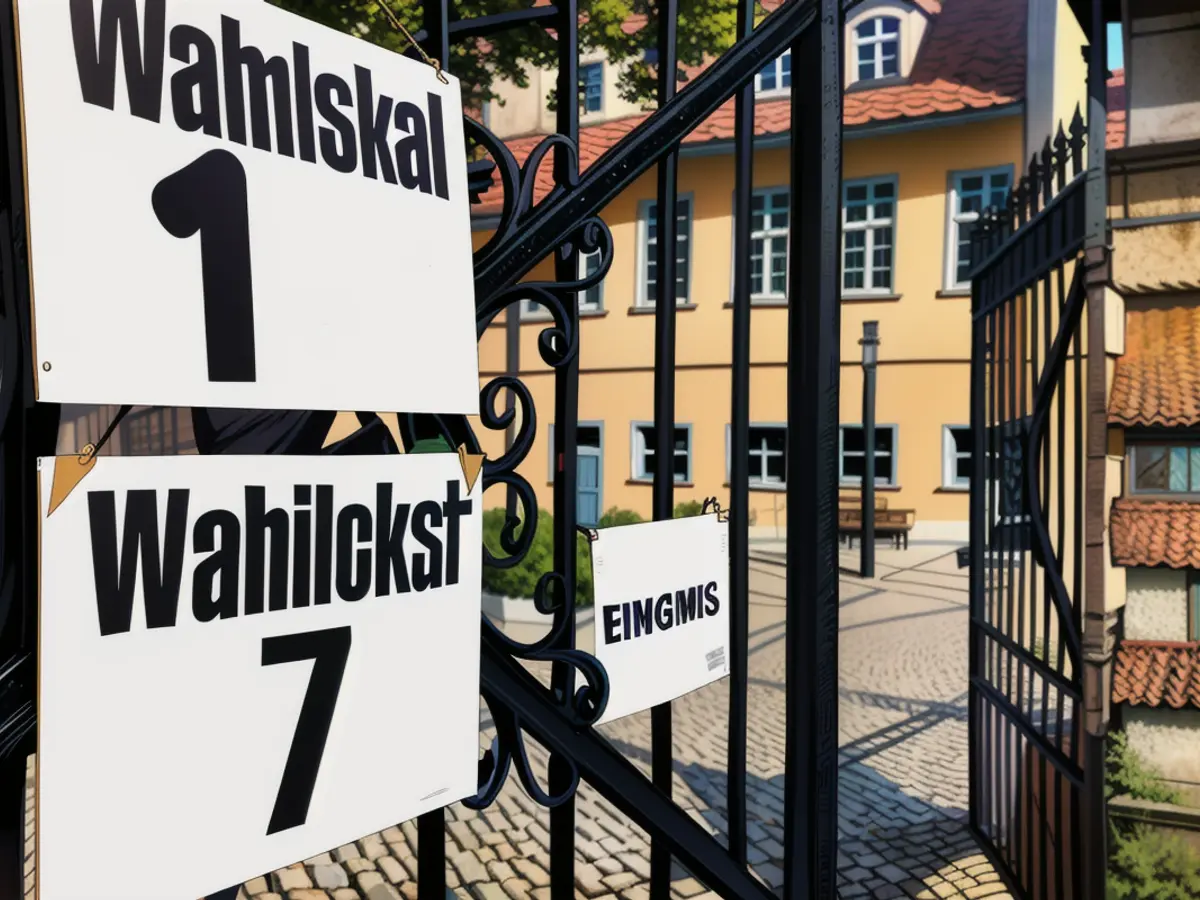Regional voting events - Thuringia: AfD fails to win elections initially
In the recent elections for district offices and town halls in Thuringia, the Alternative for Germany (AfD) party is not likely to take the lead at first. However, they may still have a shot at winning high-level positions in municipalities due to upcoming run-off elections. This is evident in districts such as Sömmerda and Wartburgkreis, where CDU and AfD candidates were neck and neck after counting half the constituencies. Similar situations emerged in Altenburger Land and Kyffhäuser districts. These local votes serve as an early indicator for the upcoming state elections slated for September 1st. Run-off elections are scheduled for June 9th, coinciding with the European elections.
Out of the 13 districts, district councillors were elected in 8 of them, 8 of which were won by the CDU. Long-standing CDU incumbents, like Germany's longest-serving district councillors in the Eichsfeld and Greiz districts, chose not to run again. The Sonneberg district was the first to have an AfD district administrator elected in 2023. However, the party, designated as right-wing extremist by the Thuringian State Office for the Protection of the Constitution, failed to win during subsequent run-off elections in other local votes within the state.
A total of 1.74 million Thuringians cast their votes for mayors and lord mayors in 94 cities, candidates for 17 district councils, and more than 600 city and municipal councils. Voting privileges were extended to 16 and 17-year-olds as well.
A notorious neo-Nazi, Tommy Frenck, made it to the second round of elections to become the district administrator in the southern Thuringian district of Hildburghausen. He garnered 24.9% of the votes, narrowly defeating CDU candidate Dirk Lindner. Sven Gregor, who represents the Free Voters of the Hildburghausen district and secured 42.4% of the votes in the first round, is a promising contender for the role of the district administrator.
Frenck's candidacy raised concerns as he did not promise to uphold the free democratic basic order, as mandated by the Thuringian Local Elections Act. A prominent figure in Thuringia's right-wing scene, Frenck had organized neo-Nazi concerts that attracted extremists from various European countries. The 2022 Thuringian report on the protection of the constitution described his operation as a "hazardous symbiosis of right-wing extremist ideology and his own economic interests."
Prior to the election, hundreds of people joined demonstrations in various parts of Thuringia, advocating for an accepting Thuringia and against right-wing extremism. According to police reports, Erfurt saw up to 2,000 participants in a single rally. Voter turnout stood at 46.2% by 4 p.m.
Ahead of the polls, the AfD led the state election polls with 20% at the time, followed by the CDU and the Left Party led by Thuringia's Prime Minister Bodo Ramelow, with 16%. Red-red-green coalition has governed Thuringia since 2014 and has been struggling to maintain a majority in the state parliament since 2020.
Read also:
- Year of climate records: extreme is the new normal
- Precautionary arrests show Islamist terror threat
- UN vote urges Israel to ceasefire
- SPD rules out budget resolution before the end of the year
- Despite the initial outcomes, the AfD still has possibilities to secure high-level positions in municipalities during the upcoming run-off elections following the district office and town hall elections in Thuringia.
- The Sonneberg district witnessed the election of the first AfD district administrator in 2023, only to face losses in subsequent run-off elections within the state.
- A total of 8 districts saw CDU victories in the district councillor elections held in Thuringia, with Germany's longest-serving district councillors from Eichsfeld and Greiz choosing not to contest.
- The CDU party continued its success in Thuringia, with 8 out of 13 districts electing district councillors in the recent local elections.
- Björn Höcke, a prominent figure in the AfD, has been actively campaigning in various districts, including the District of Hildburghausen, for the state elections taking place on September 1st.
- The Mayor of Greiz, a position held by the CDU, will undergo a mayoral election this year, providing an opportunity for competing parties to challenge the current incumbent.
- Local elections in municipalities like Sonneberg and Eichsfeld are serving as precursors for the state elections, with close races between CDU and AfD candidates indicating potential shifts in political power.
- In several districts, such as Greiz and Altenburger Land, the CDU and AfD are closely matched in the run-up to the state elections, as seen in initial counting results from the local elections.
- Thuringia's municipalities are preparing for mayoral and district council elections, with the CDU and AfD leading the polls, followed by the Left Party led by Prime Minister Bodo Ramelow.
- In the eastern Thuringian district of Hildburghausen, Tommy Frenck, a known neo-Nazi, advanced to the second round of elections for the district administrator position, garnering 24.9% of the votes, raising concerns about his commitment to upholding democratic principles.
- The European elections are scheduled to coincide with the run-off elections in Thuringia on June 9th, marking a critical period for parties to gain voter support and potentially secure influential positions both locally and nationally in Germany.
Source: www.stern.de








